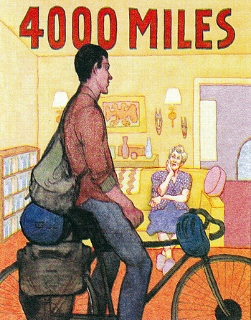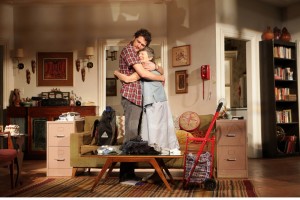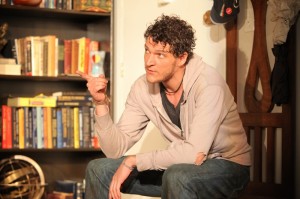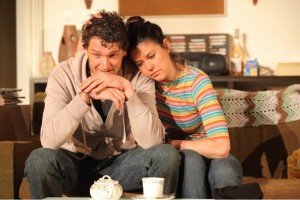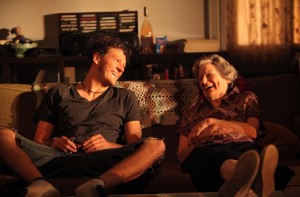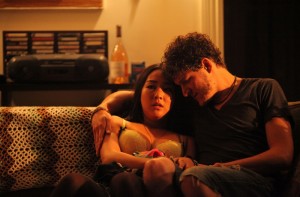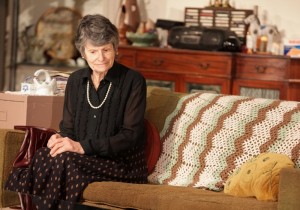MILES OF TALENT AT LINCOLN CENTER
As a reviewer, I don’t like to pander in hyperbole, but since this year has been such a second-rate season in New York, I think it’s safe to say that 4000 Miles will be remembered as one of the best shows of the season. Upon its opening, fortunately, Amy Herzog’s new play at the Mitzi E. Newhouse Theater has already been extended. Because the marriage of play and production so rarely comes together with such grace and dignity, New York theatergoers are advised to get tickets posthaste.
4000 Miles involves the relationship between Leo and Vera Joseph, grandson and grandmother. Leo suffers the tragic loss of a best friend during a cross-country bike trip, and he ends up staying with Grandmother Vera in New York City until he can figure out what to do next with his life. Both Leo and Vera share progressive political ideology, but not the Democrat-voting, lip-service liberalism of Leo’s mother (unseen in the play); indeed, Vera is a “card-carrying member of the Communist Party.”
Herzog teases you into thinking her play will be a battle between old progressives who still believe in a Marxist dream and new progressives who refuse to eat carbon footprint-causing bananas. Herzog has bigger ideas to explore. 4000 Miles is actually about the distance between our personal responsibility and our responsibility to our communities. The playwright treats this debate with fairness and compassion, but in the end, she knows that individuals can only progress so far within the context of their community. 4000 Miles may be a small play, but it tackles a very big idea.
The sublime Mary Louise Wilson plays Grandmother Vera with a balance of forthright candor and unexpressed need. She delivers Herzog’s truncated lines with such believable naturalness, that your heart jumps a beat every so often for fear she’s forgotten her lines — until you realize Wilson is at the peak of her form and simply selling the truth of Herzog’s carefully chosen rhythms and words. Wilson also has that rare gift of living honestly in the moment; her sensational performance fills the Newhouse stage with love.
Leo, the more difficult of the two roles, is beautifully orchestrated by Juilliard grad Gabriel Ebert. Mr. Ebert sweetly invites the audience in and allows us to engage directly with Leo’s journey, which begins with a righteous swagger, fighting the need for both vulnerability and connection. Slowly, Ebert surrenders to the inevitable healing of truth-telling and grief, allowing his Leo to live so completely in the grieving process that I was moved to tears by his delicate work. Director Daniel Aukin deserves some of the credit as he guides Wilson and Ebert to trust the silences and let the audience slowly and deliberately fall in love with the characters.
Zoe Winters is a completely believable Bec, Leo’s sensibly progressive girlfriend who’s attending college in New York. She beautifully portrays the conflicted nature of their relationship with logic and compassion. Greta Lee plays Chinese-American art student Amanda, a stranger who horny Leo picks up one night to fill his emptiness with some casual sex. By populating the play with Amanda’s less positive take on the Chinese legacy of Marxism, Herzog doesn’t let her American progressives off the hook easily. This is a world where nothing, neither politics nor the minor characters, is black-and-white. Lee and Winters fill their roles with so much life and purpose that they never appear as incidental or mere story devices.
It’s hard to imagine a production of 4000 Miles as good as Aukin’s; he measures and paces the evening so confidently that the 100 intermission-less minutes never feel long. The breaks between scenes give the production an organic feeling of the actual passage of time, supported by Ryan Rumery’s graceful music. Japhy Weideman’s uniformly effective lighting never draws attention to itself, but always lets us know exactly where we are in the day or night, including a very sweet scene during the Autumnal Equinox. Weideman and Aukin make the very wise choice to light Leo’s revelation speech in a simple sliver of moonlight as if to say this is just a slice of the illumination to come. Finally, Lauren Helpern’s realistic New York apartment set design perfectly accommodates all the action while suggesting the downside of long-term rent-control. Vera’s apartment is long overdue for a renovation, worn wooden floors and all. Herzog’s play lives in a world of simple, one-set realism, but Aukin’s production never feels oppressed by this limitation.
If I were to whisper one suggestion into Amy Herzog’s ear, it would be to start reaching higher dramaturgically. 4000 Miles and her prior After the Revolution are both very good realistic, character-driven plays about political progressives, clearly Herzog’s comfort zone. Neither play has much of a plot nor offers anything beyond the limited territory of kitchen sink realism. Herzog has proven she can write a damn good play with the subtlety of a Grace Paley story. I challenge her now to unshackle the limiting chains of realism and see where she can take us next.
photos by Erin Baiano
4000 Miles
Mitzi E. Newhouse Theater
Lincoln Center
ends on June 17, 2012EXTENDED through July 1, 2012
for tickets, visit LCT
